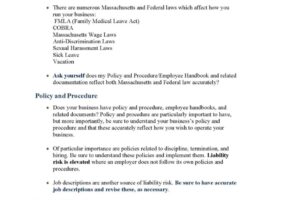
Massachusetts Business Dissolution – What is it?
Massachusetts corporations that are incorporated need to follow specific ‘rules’ when seeking to break up or dissolve the company. Dissolution of a business can be done voluntarily or involuntarily. This article aims to educate the reader as to how a Massachusetts business dissolves, which is very useful if you are a shareholder in a small, medium or large corporation and wondering how to break away…
Involuntary Dissolution of a Massachusetts Business
When a corporation in Massachusetts fails to make annual filings with the Secretary of State, or fails to pay taxes, or is ordered by a court to dissolve, it is possible that the corporation will be involuntarily dissolved. When this occurs, shareholders of the corporation may be surprised to learn that the corporation has been dissolved – meaning, the corporation is no longer recognized by the Massachusetts Secretary of State. Contact our offices if you, as a shareholder of a Massachusetts corporation, find yourself in this unfortunate position.
Voluntary Dissolution of a Massachusetts Business
Still, at other times, a shareholder or shareholders of a Massachusetts corporation may find it necessary to break up or dissolve the corporation. One common question that shareholder have is, “how is this done?”
If you are incorporated in Massachusetts, you will have filed articles of organization with the Secretary of State’s Office. Such articles may have been drafted to consider dissolution by shareholders. Where articles of organization provide clear instructions or methods of dissolution, and the shareholders wish to dissolve the corporation, these procedures are likely going to be used to enable dissolution. If during the formation of the corporation the shareholders used an online business formation program, it is likely that these articles have not contemplated what would happen in the event of dissolution of the corporation – something that private business attorneys have familiarity with customizing to address just these types of situations.
The Massachusetts’ Business Corporation Act
When a corporation is lacking clear direction from the articles of corporation, the shareholders might wish to use the default rules of the Massachusetts Business Corporations Act (the “BCA”), which provides, in part:
- if the articles of organization of the corporation do not contain rules for voluntary dissolution of the corporation; or
- if the articles of organization do provide rules for voluntary dissolution but do not also indicate that those rules must be used exclusively….then, a corporation may use the BCA procedure to dissolve the corporation.
The BCA procedure, is for the board of director to take the necessary action to dissolve the shareholders, followed by a vote on this proposal of the board by the shareholders. Proper notice of such a vote must be provided to all shareholders, even for shareholders without voting rights. At this point, and unless you current articles of organization or corporate bylaws or even shareholder’s agreement have indicated a different majority, the proposal must achieve approval by 2/3 of the shareholders entitled to vote at a minimum. Keep in mind that depending upon whether or not the corporation has multiple voting groups a different majority rule will apply under the BCA.
In addition to notice requirements under the BCA, the BCA allows for corporations to avoid formally meeting to vote on dissolution if written consent is provided by all shareholders whit voting rights on the subject. But keep in mind, that it is quite possible that the bylaws, and/or shareholders agreement of the corporation may have overriding or conflicting rules on the subject of shareholder voting rights, majority rules, notice, and consent. Our firm has experience in interpreting these documents and can assist a shareholder or a corporation where conflicts between them may exist.
What Dissolution Does Not Do
- Dissolution of a corporation does not stop a lawsuit against the corporation or by the corporation
- Dissolution doesn’t change the duties that director and officers of the corporation to the corporation or to each other
- Dissolution of your corporation doesn’t generally affect titles held by the corporation to property
- Dissolution of a corporation doesn’t stop a lawsuit against the corporation
Filing Articles of Dissolution
One of the key practical steps that a corporation must take when dissolving is to file articles of dissolution with the Massachusetts Secretary of State. Contact an attorney to ensure that the Articles being filed meet all statutory obligations. Generally speaking, articles of dissolution must contain the corporations name, and the date that the dissolution was authorized (according to the bylaws, shareholders agreement, or articles of incorporation as previously mentioned).
What’s in a Name
Please be aware that the name of the business is up for grabs after the dissolution of the corporation. Once the articles of dissolution become effective, assuming all other required aspects of dissolving a company are in place, the company name is in the public arena and open for any and all interested parties to take.
What’s Next for a Company that Has Dissolved – Winding Up
The next article in this series deals with the winding up process of a corporation – a period where the things that need to get done, get done.
Understand that closing, breaking up or dissolving a corporation in Massachusetts is not a simple process. To be done right, to gain the benefits of liability protection, the corporation must follow specific steps which vary corporation to corporation. Contact our offices to learn more and get assistance with dissolving your Massachusetts corporation.
DISCLAIMER:
The information provided in the pages and posts of this website are for general informational purposes only. The information presented on this site is not legal advice, and no attorney-client relationship is formed by the use of this site.
CALL US NOW


